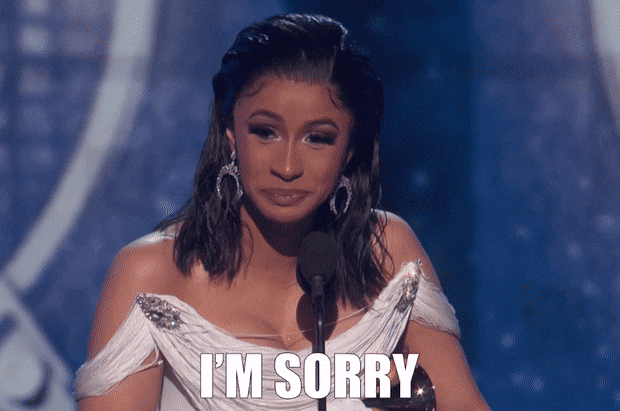We’ve all been conditioned to say “sorry” at the drop of a hat, and it usually does more harm than good.
Saying “sorry” to soften a perfectly reasonable request at work, when you return a cold meal at a restaurant, or when you ask a queue-jumper to go to the back of the line might seem harmless, but placing “sorry” before your words too often negates their power — and yours.
The sorry stats
Women are more likely to apologise than men. A set of studies published in Psychological Science found men and women apologise equally for what they feel is offensive behaviour, but because women have a lower threshold for what’s considered offensive, they apologise more often.
A recent survey by Heat, a US-based consultancy partnered by Deloitte Digital, found 87% of women apologise at least once a day compared to 73% of men. At work, women apologise more than men, regardless of their job title.
The survey also reports that both men and women apologise when they think they’re at fault, adding that women say “sorry” a lot more often when the apology is related to empathy. So we’re more likely to apologise for interrupting a boss, asking a waiter about a reservation, or inquiring about a friend’s lost pet.
Gender splits — who’s sorry most?
What’s behind women’s lower threshold for offensive behaviour and empathy response? Psychologist Dr Marny Lishman says apologising is a safety behaviour women are taught to use to prevent conflicts. “Women have traditionally played the role of peacekeepers — generally speaking, women are taught to be agreeable and avoid upsetting people,” she explains.
Dr Lillian Nejad, a clinical psychologist at Omnipsych, says the differences between the genders are social rather than physiological. “Common ideas about the gender difference are related to cultural norms and societal pressures and messages that require women to behave and communicate in a more conciliatory and polite manner, whereas men are socialised to consider apologising as a display of weakness,” she says.
She adds that over-apologising may reflect lower self-esteem and self-confidence. “Saying ‘sorry’ is used as a shield against the possibility of negative judgement or losing relationships,” says Dr Nejad. “In my practice, I have found that women tend to be more concerned about the appropriateness of their behaviour and therefore apologise ‘just in case’ they may have done something wrong or to get reassurance from others that they are OK and still liked.”
Why sorry is so bad for you
One of the biggest issues with over-apologising is it negates much of what you say afterwards. According to Heat, “using ‘sorry’ as a crutch for our real opinions and intentions exacerbates issues surrounding gender equality by making women appear and feel more subordinate”.
Consider the difference between “sorry, your work isn’t up to standard” and “your work isn’t up to standard”. Which is more authoritative? “When you say ‘sorry’, you’re giving your power away,” says Dr Lishman.
Sorry, not sorry!
English speakers use “sorry” in a lot of peculiar ways and a lot more often than speakers of most other languages. Of course, we use it to admit guilt when we’ve done something harmful — “Sorry I spilt coffee on your sleeve” — but we also use it to diffuse awkward or confrontational situations: “Sorry, but there’s someone sitting there” or “I’m sorry, but you can’t take the day off work”. Perhaps most striking is our use of the word when a stranger bumps into us on the street — we apologise even when we’re not at fault!
How to apologise less
Identify your triggers. “Spend a few days writing down the trigger for every apology you make — was it in response to an unjust, harmful or hurtful action, was it to avoid conflict, was it in response to feeling anxious, or was it just out of habit?” says Dr Nejad.
Think before you speak. “When you feel like you’re going to say ‘sorry’, just stop and sit in the uncomfortableness of not saying ‘sorry’ and see what transpires. Often it doesn’t need to be said and the conversation continues to flow,” explains Dr Lishman.
Break the habit. “Replace ‘I’m sorry’ with an expression of gratitude. If you usually say ‘sorry’ for expressing an opposing opinion, state how much you appreciate the other person for listening with an open mind. If you’re asking for a favour, instead of saying ‘I’m sorry to inconvenience you,’ say ‘I really appreciate you doing this for me,’” says Dr Nejad.
Don’t be sorry, not sorry. “Have a think if you’re really sorry and don’t apologise if you’re not sorry. Make it a sincere thing,” adds Dr Lishman.
This story originally appeared in Fernwood magazine.








